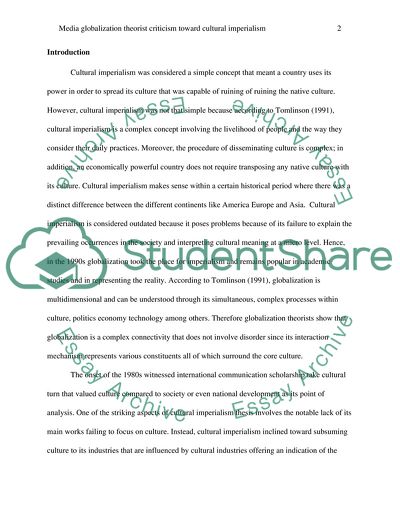Cite this document
(Media Globalization Theorist Criticism toward Cultural Imperialism Report Example | Topics and Well Written Essays - 2500 words, n.d.)
Media Globalization Theorist Criticism toward Cultural Imperialism Report Example | Topics and Well Written Essays - 2500 words. https://studentshare.org/culture/1814194-outline-the-main-criticisms-of-the-cultural-imperialism-thesis-made-by-media-globalisation-theorists-are-these-criticisms-valid
Media Globalization Theorist Criticism toward Cultural Imperialism Report Example | Topics and Well Written Essays - 2500 words. https://studentshare.org/culture/1814194-outline-the-main-criticisms-of-the-cultural-imperialism-thesis-made-by-media-globalisation-theorists-are-these-criticisms-valid
(Media Globalization Theorist Criticism Toward Cultural Imperialism Report Example | Topics and Well Written Essays - 2500 Words)
Media Globalization Theorist Criticism Toward Cultural Imperialism Report Example | Topics and Well Written Essays - 2500 Words. https://studentshare.org/culture/1814194-outline-the-main-criticisms-of-the-cultural-imperialism-thesis-made-by-media-globalisation-theorists-are-these-criticisms-valid.
Media Globalization Theorist Criticism Toward Cultural Imperialism Report Example | Topics and Well Written Essays - 2500 Words. https://studentshare.org/culture/1814194-outline-the-main-criticisms-of-the-cultural-imperialism-thesis-made-by-media-globalisation-theorists-are-these-criticisms-valid.
“Media Globalization Theorist Criticism Toward Cultural Imperialism Report Example | Topics and Well Written Essays - 2500 Words”. https://studentshare.org/culture/1814194-outline-the-main-criticisms-of-the-cultural-imperialism-thesis-made-by-media-globalisation-theorists-are-these-criticisms-valid.


